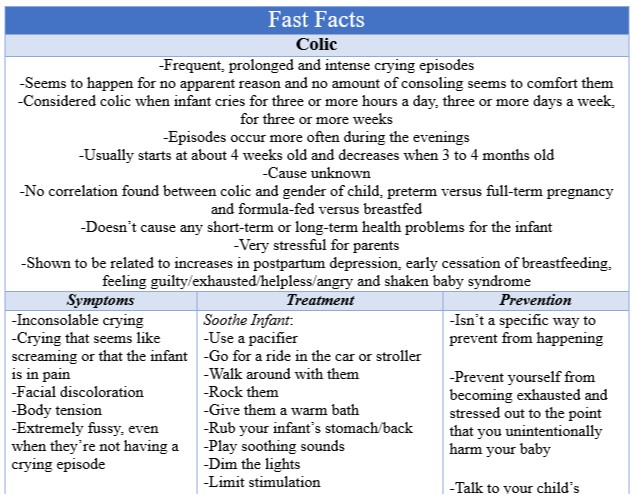Why is your baby crying?
Sure, babies cry…a lot! That’s their way of communicating their needs. Usually once they are fed or had a diaper change, they calm down. What happens if they don’t stop crying? No matter what you do, it doesn’t seem to make a difference. Your baby might have colic. What causes this? How do you manage it? Is there a way to prevent it?
 Definition
Definition
Colic is when an infant has frequent, prolonged and intense crying episodes. It’s normal for an infant to cry, but with colic, it seems to happen for no apparent reason and no amount of consoling seems to comfort them. An infant is considered to have colic when they cry for three or more hours a day, three or more days a week, for three or more weeks. The episodes occur more often during the evenings and usually start when the infant is about 4 weeks old and decreases considerably by the time they are 3 to 4 months old. Sometimes, the crying can seem like screaming or that the infant is in pain and causes facial discoloration and body tension. Some infants are extremely fussy, even when they’re not having a crying episode.
The cause of colic is unknown, but thought to be related to a digestive system that isn’t fully developed, food allergies/intolerances, overfeeding/underfeeding/infrequent burping, early form of childhood migraine, family stress/anxiety and whether the mother smoked during pregnancy/after delivery. There has been no correlation found between colic and gender of child, preterm versus full-term pregnancy and formula-fed versus breastfed. It’s important to note that colic doesn’t cause any short-term or long-term health problems for the infant.
Colic is very stressful for new parents. It has been shown to cause increases in postpartum depression, early cessation of breastfeeding, feeling guilty/exhausted/helpless/angry and shaken baby syndrome. Sometimes when parents are trying to calm their child and become frustrated, they might shake or harm the infant in some way. This can cause serious damage to the infant’s brain and result in brain damage or death.
Treatment
There are two main goals in the treatment of colic. The first is to soothe the infant as much as possible by having a variety of interventions because one might work at one time and not another. Some things to try include using a pacifier, going for ride in the car or stroller, walking around with them, rocking them, giving them a warm bath, rubbing your infant’s stomach/back, playing soothing sounds, dimming the lights and limiting stimulation. Sometimes changes in feeding practice, like feeding your infant upright and burping them frequently during and after feeding can be helpful. Using a curved bottle or one with a collapse bag will help air from getting into your child’s stomach. In addition, your doctor might recommend trying a different type of formula if you are using that or to change the mother’s diet if you are breastfeeding. Some foods that you could be eating and affecting your infant are foods that are common allergens, caffeinated products, cabbage or onions.
The second goal is to help parents get the support they need. When your infant is colicky, it’s very taxing. It’s ok to need a break, so take turns with your significant other or enlist the help of family and friends. If you are feeling upset, it’s a good idea to place your infant in their crib for short periods of time if they’re crying, so you can collect yourself. Talk to family members, friends and your child’s doctor about what you’re feeling. Be sure to eat healthy, make time for exercise and sleep when your baby sleeps. Have a plan in place, so if you’re feeling overwhelmed, you can call on someone to help you. The key thing to remember is that this is a temporary phase and it isn’t a sign of poor parenting or your baby rejecting you.
Prevention
Since the exact cause is unknown, there isn’t a specific way to prevent colic from happening. The key thing to remember is to prevent yourself from becoming exhausted and stressed out to the point that you unintentionally harm your baby. It can be helpful to talk to your child’s doctor for recommendations on what to do to help ease your child’s symptoms.
Colic is a difficult and frustrating experience for many parents. Keep in mind that you’re not alone and it will get better. If you have any questions or concerns about colic, please speak with your child’s doctor. If you would like more information, please visit the Cleveland Clinic’s colic page at https://my.clevelandclinic.org/health/diseases/10823-colic